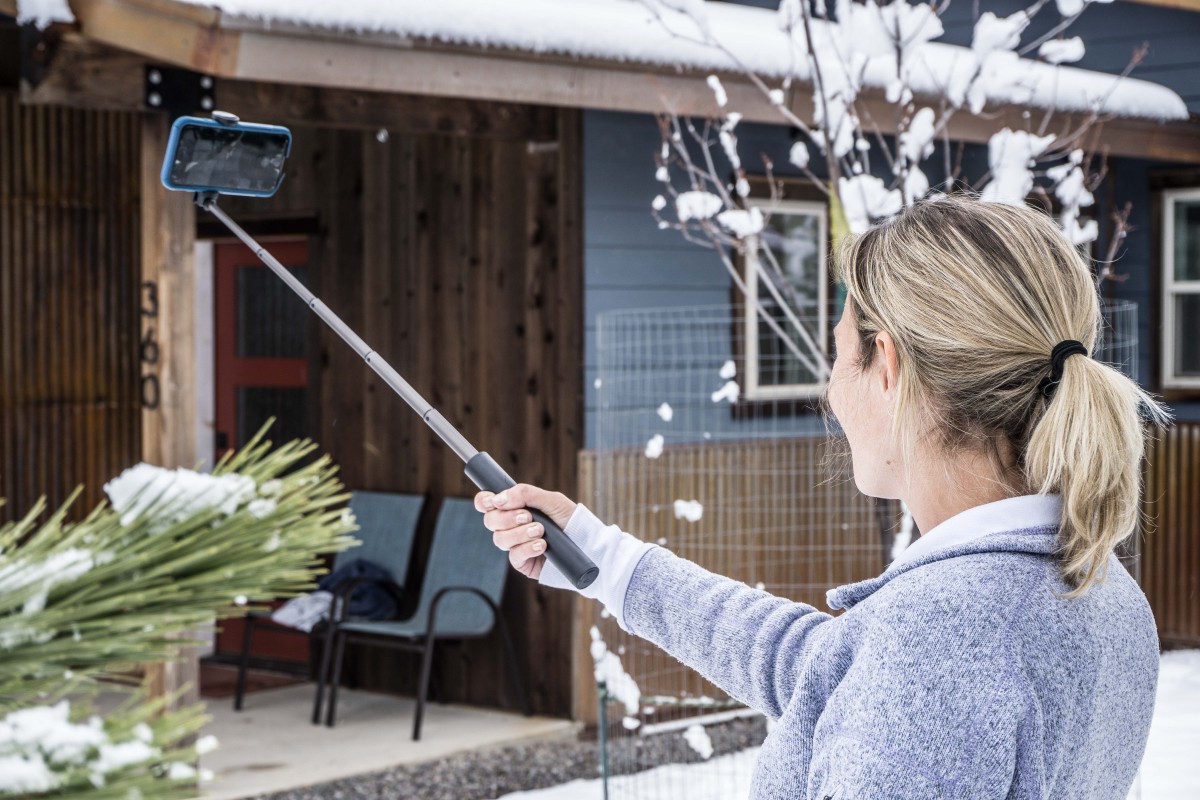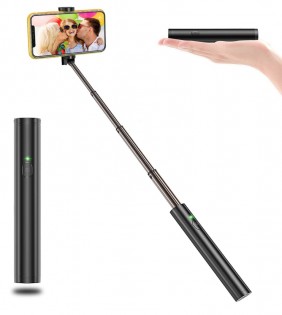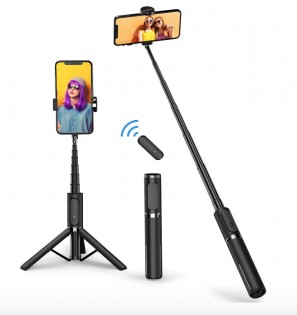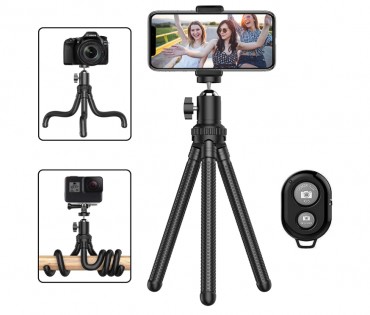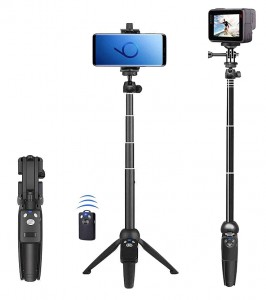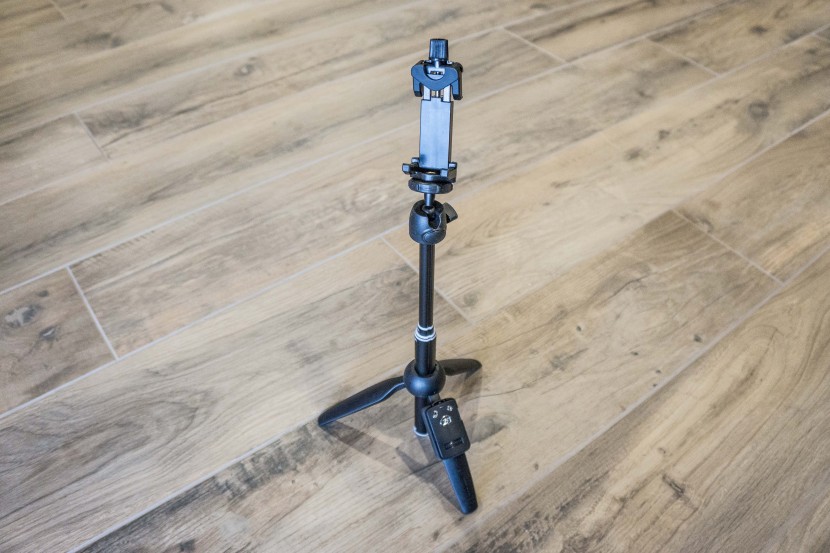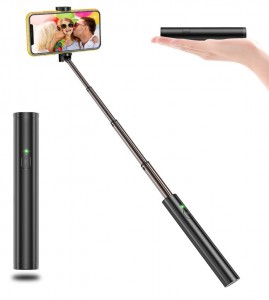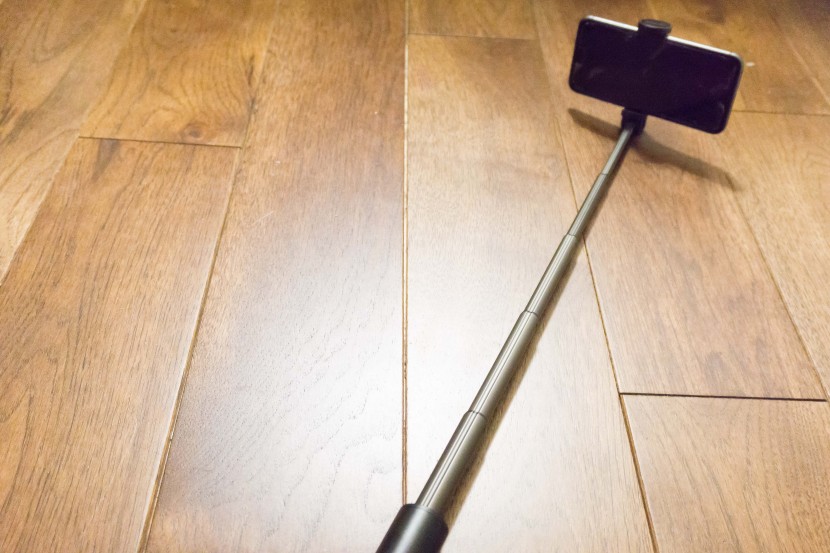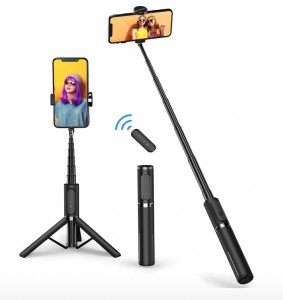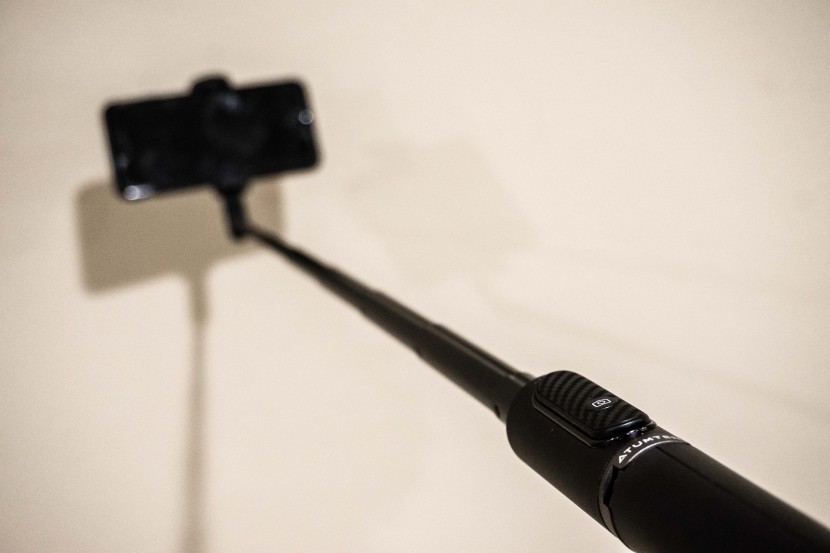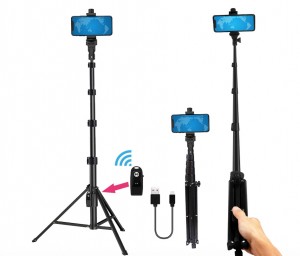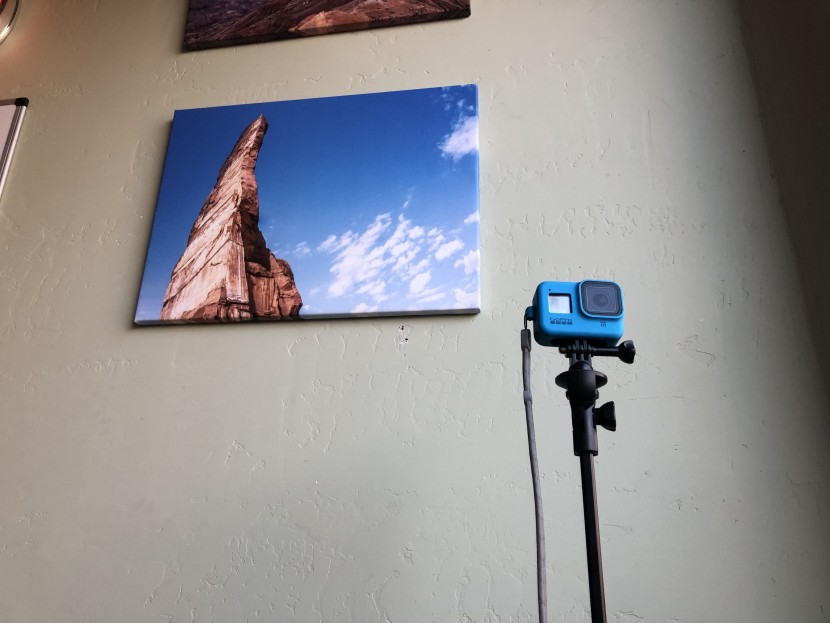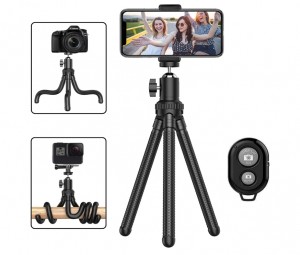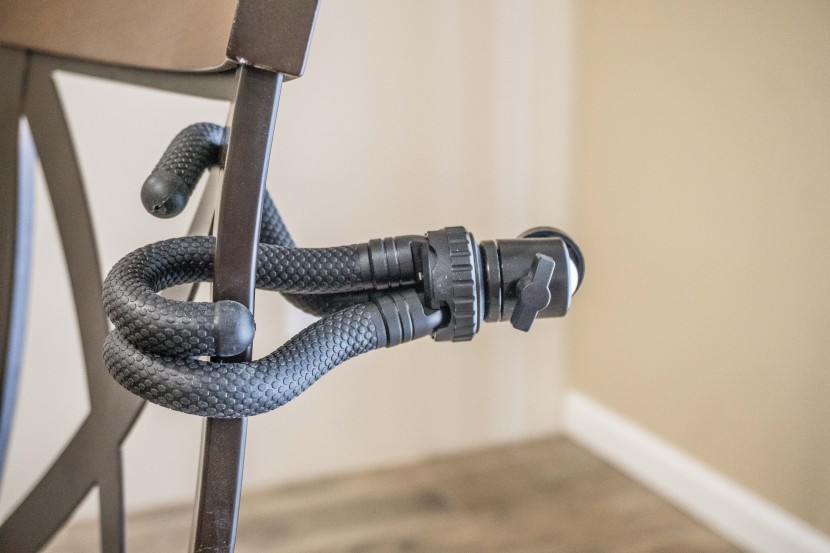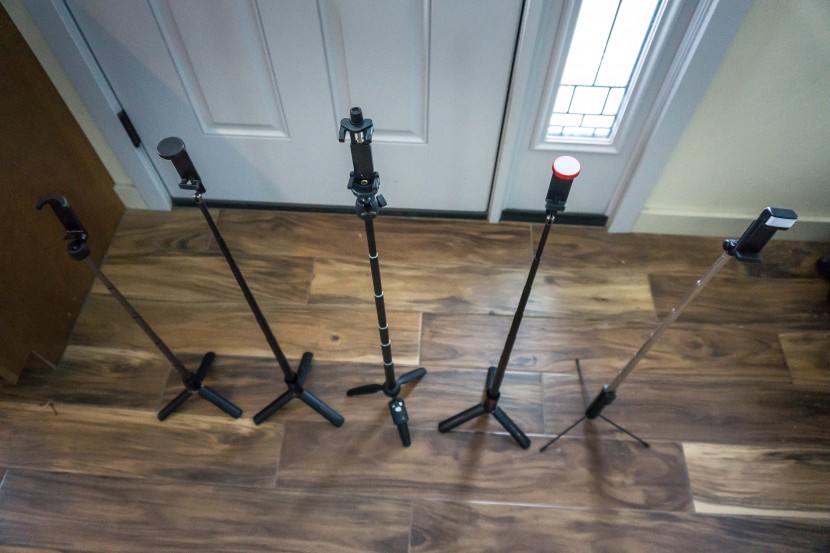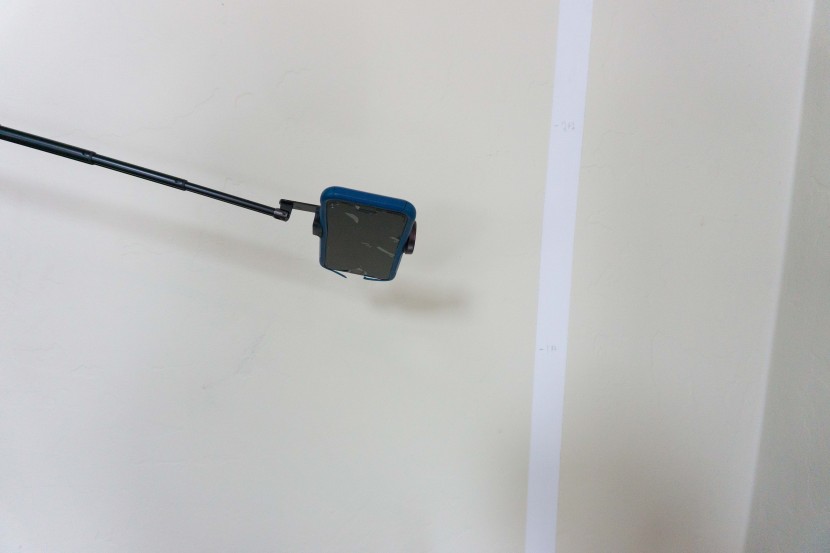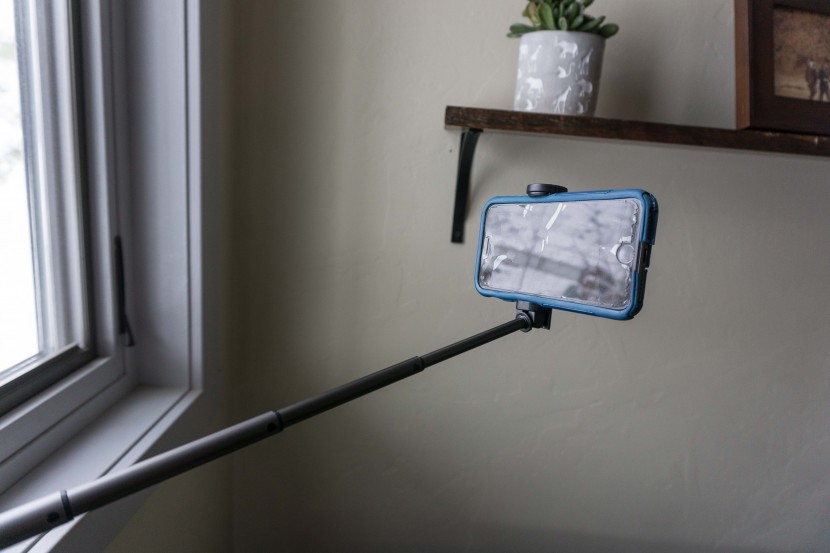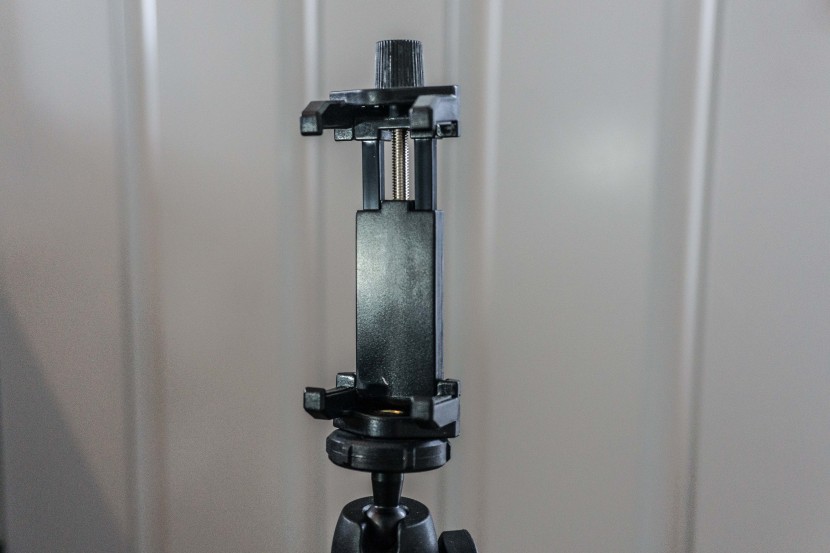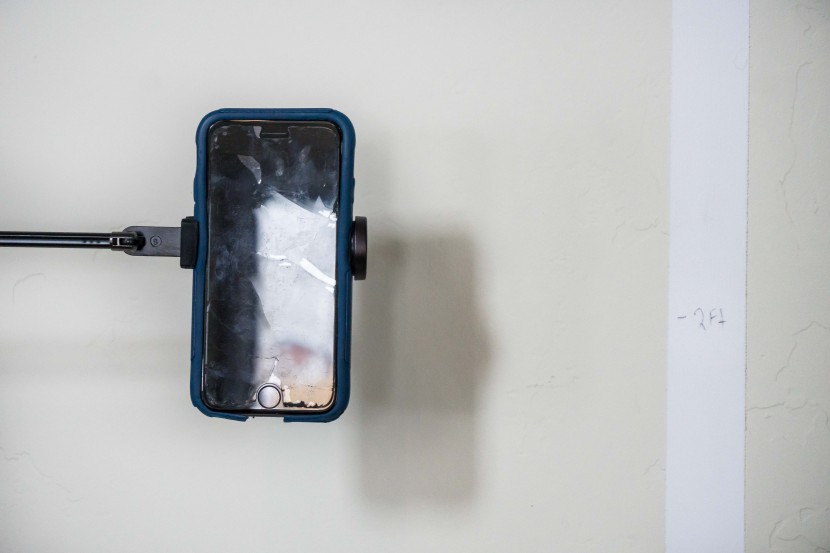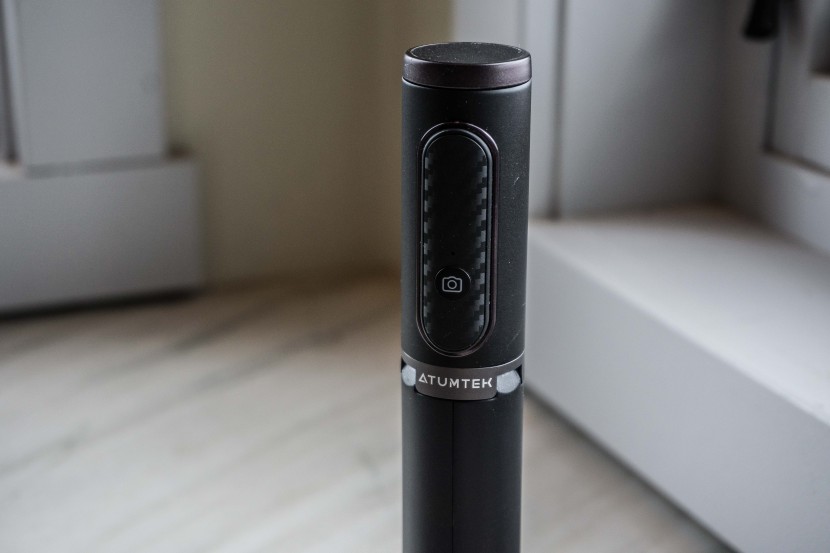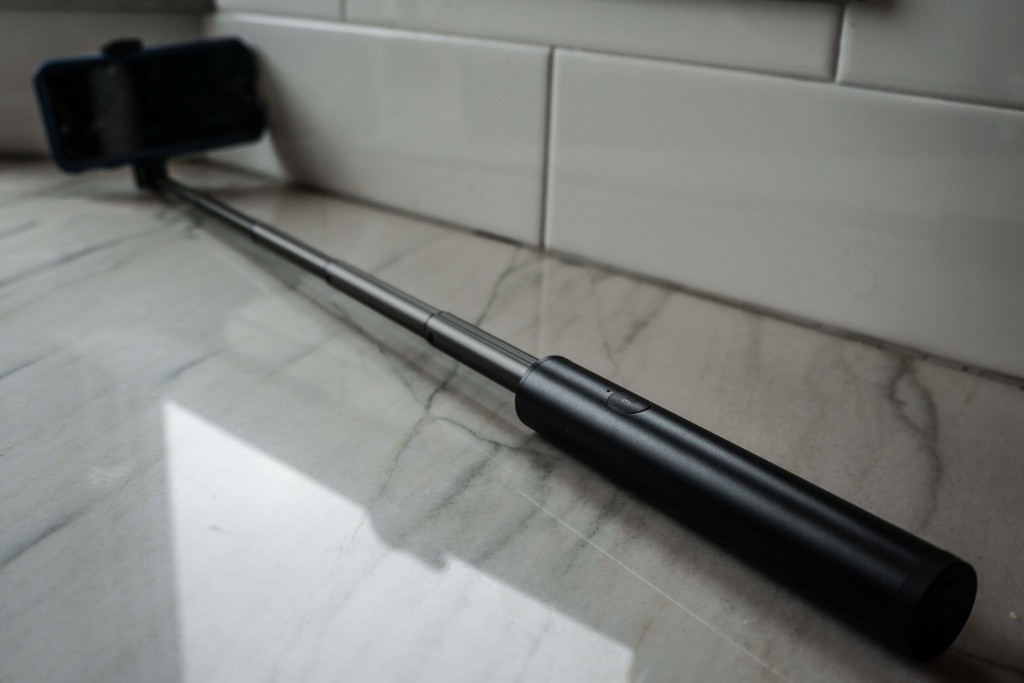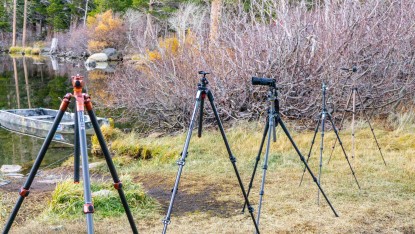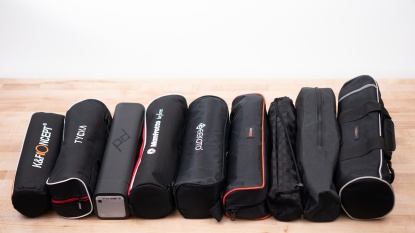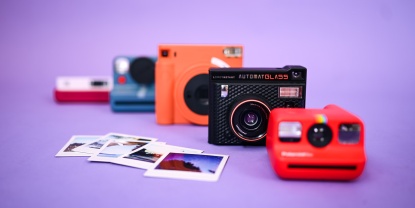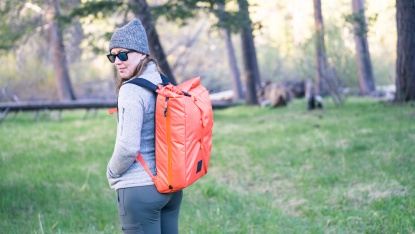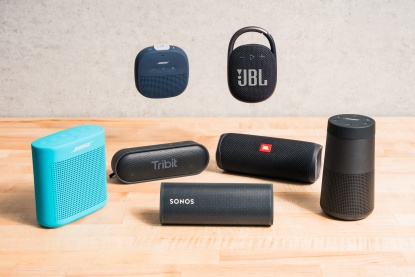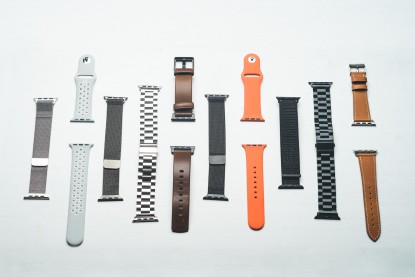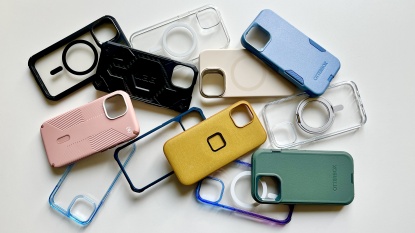
Our Top Picks
Best Selfie Sticks
Extension Amount: 40 inches | Cell Phone Attachment System: Screw Tightened
The BZE 40-Inch Extendable is a compact and versatile option. It can fold into a super portable profile and also offers a screw-tightened mount, 40 inches of extension, and a tripod. With a mount adapter, it can accommodate other cameras such as a GoPro, further increasing the versatility of a “do anything” device. Its screw-tightening mount system securely held our devices, even during the entire duration of our shake test. As we carried this product around the mountains, we never felt that it was too bulky or heavy to bring along, regardless of the backpack used. Lastly, our drop tests revealed that the BZE was as durable as it was versatile.
While the BZE fits a lot in a relatively small package, we found the tripod legs less inspiring on uneven ground. Furthermore, there was a slight wiggle in the telescoping extension, though this may not be a concern for many users, with device mounting security being the priority. The BZE is best for those in the market for a selfie stick that focuses on versatility and cell phone holding security.
Extension Amount: 26 inches | Cell Phone Attachment System: Springs
The Vproof Bluetooth Selfie is incredibly streamlined. It was both the lightest and smallest (when stowed) selfie stick we tested. The simple design features a (non-removable) remote shutter built into the handle, and extensions are made by simply pulling on the end of the stick. It performed well relative to its weight during the shake and drop tests, making this product a great option at its price point. It offers super-fast setup, which is helpful for getting that impromptu shot at a party or on vacation.
The Vproof lacks a tripod, which might be a dealbreaker for some. If such is the case for you, consider checking out other models we tested, like the BZE 40-Inch Extendable or the Lifelimit Tripod. In our drop testing, on the fifth round of the concrete drop test, the removable battery (to power the remote shutter) fell out of the bottom of the handle, though the stick overall held together otherwise. During the shake test, the cell phone lasted most of the duration of testing but failed on the final four shakes, which we still found impressive given the mount's size. The Vproof is best for individuals shopping on a budget and looking for a well-built, lightweight model where handheld use is anticipated.
Extension Amount: 31.3 inches | Cell Phone Attachment System: Springs
From head to toe, the Atumtek is built with lightweight yet quality materials and design. While we would have loved to see a screw tightening attachment system, the spring-based cell phone holder was easy to use and held up to our shake test without any movement or holding failure. It offers a standard slew of features, including a tripod and a shutter remote, which were simple, functional, and durable. What truly made it stand out was the quality of construction in extending or stowing the stick. When extended, the telescopic sections didn't wiggle in the slightest while performing the shake and the drop test, which was a rarity in this review. The stowed profile was similar to the profile of an electric toothbrush, easily fitting into any piece of luggage, purse, or hiking bag we used during testing. Lastly, the durability of this product was unwavering, which we found surprising given its low weight.
The Atumtek has an extension of about 31.3" inches, which is better than many products in this review, but some will still find this limiting in the photos they take. The tripod and the shutter remote features allow for photos taken further away, but the short extension also limits the height of one's camera when utilizing the tripod. Lastly, this option is only compatible with cell phones, limiting the device potential greatly. It's best for cell phone photographers looking for a model they can keep with them at all times while traveling.
Extension Amount: 54 inches | Device Attachment System: Screw tightened
The Lifelimit has a tripod design that heavily favors use where weight and space aren't a concern. This product is by far the largest contender we tested but offers a robust and secure tripod system with each telescoping extension secured with flip locks — similar to a trekking pole. At 54 inches, this tripod system allows for the greatest amount of extension of the review, with the average extension of other products sitting around 25-30 inches. We also loved the screw tightening mount for cell phones, which easily passed our device shake test. The Lifelimit offers the standard Bluetooth shutter remote with a rechargeable battery and is compatible with Apple or Android operating systems.
The Lifelimit is more so a tripod than a selfie stick, so it's incredibly bulky for transport or handheld photos. Additionally, during our drop tests, a few small parts broke, including a portion of the knob for the tripod tightener. Ultimately, everything was as functional after the drop test, but it didn't inspire confidence in more rugged tripod use. The Lifelimit is best for those looking for a tripod-focused option, where weight and space are less of a concern.
Extension Amount: 0 inches | Cell Phone Attachment System: Springs
The Erligpowht Phone Tripod is a unique and well-built design. The focal point is its tripod legs, which are made of a flexible rubber material that allows the stick to be attached to a handrail or tree branch. While it took some getting used to, we loved this tripod design given its incredibly small size relative to its functionality. Additionally, it can be used with a variety of different cameras depending on the camera's screw diameters, which was a rarity in this review. The ball joint that allows for mount mobility was our favorite angle adjuster in the entire review, with a screw tightener keeping that ball joint secure.
The Erligpowht has absolutely zero extension. In an otherwise great product, this was a major downside that we had a difficult time working around during testing. Without an extension, we could not use this device very effectively as a handheld model and even had its setbacks as a tripod. The bendable legs are great, but we had several instances where we wanted the tripod to be higher off the ground for a photo, and unless there's something like a tree, fence, or light pole nearby, you're simply out of luck. The Erligpowht is best for those who want a tripod-focused option for travel where luggage space is limited.
Why Trust GearLab
We purchased 5 of the top selfie sticks to analyze side by side. We tested the products in this review by spending several hours with each option over the course of four weeks. Each product was put through five drop tests onto concrete, as well as an intense shake test to investigate durability and how well each product held onto an electronic device. Additionally, we examined the features and value of each product.
Spearheading the testing of this review is Zach Lovell. In addition to being a tech product reviewer, Zach has spent nearly a decade as a photographer in the mountains, both for paid content generation and while guiding students/clients. Many clients Zach has brought into the mountains have brought selfie sticks/tripods to maximize the photo opportunities in environments inherently unique to the alpine environment. Additionally, we consulted several other opinions on the more subjective categories of this review.
Analysis and Test Results
To determine the best selfie stick, we created four categories to rate each product in a head-to-head battle. These categories include device holding security, durability, features, and value.
Device Holding Security
First and foremost, a selfie stick needs to be an extension of one's hand, and therefore not let go of your precious electronics while taking a selfie. For this metric, we created a rigorous test that we named the shake test. We measured a four-foot distance on a wall, put a cushion below our test area, attached a cell phone to the product, and performed 50 shakes at that four-foot distance. We recorded the number of shakes performed before the cell phone fell out, and we even performed the 50-shake test twice on each product, using the average between the two test results as the product's score.
The BZE topped the list in the device holding security category. While there were numerous products that passed the shake test, the BZE was one of the only options that offered a screw-tightened cell phone mount. This mount offers a much tighter grip than the more common spring-based cell phone attachment. The other product that offered a screw-tightened mount was the Lifelimit, which did very well in this category but appeared less durable.
Durability
Selfie sticks will inherently get banged up over the course of their life, whether their owner is a world traveler, a parent, or a social media influencer. We decided to test durability with an old-fashioned drop test from five feet onto concrete, five times in a row. We gave each product a head-to-toe examination after the drop test to see if anything was broken or if any functionality was reduced/lost. We additionally tested each product in a hiking/climbing setting, where they were dropped, scratched, pulled, and twisted to see how they'd hold up under “adventurous photo-taking”.
The lightweight Atumtek stood out in this metric for its resilience to being dropped and drug around the outdoors. The most common ailment regarding durability was the telescoping sections of the extensions, which would loosen after testing durability. With the Atumtek, its extensions and the rest of the selfie stick were just as functional and solid before and after durability testing.
Features
We assessed each product in the category of features based on the number of features, the relevancy of those features, and the functionality of those features. We created two parts to the features metric, including baseline and bonus features. We defined baseline features for a selfie stick as the length of extension, remote shutter, tripod, and cell phone mount. For bonus features, we included multi-camera compatibility, photo lamp, and screw-tightened device mount. The most effective method we used to test features was to take each product out on as rigorous of a selfie-day as possible, which included dragging selfie sticks up climbs and hikes. Taking each model out for extended use unearthed the quality (or lack thereof) of each device's features and any nuances of design that were worth mentioning.
The Vproof performed well, and it had one of the lowest listed prices in the review for a decent product. Most of the other products in this review were twice the cost of the Vproof.
Conclusion
There are many different selfie sticks on the market, so it can be daunting to find the right one for you. To help, we've reviewed a variety of models and highlighted the performance of each one. We hope the products we've tested will allow you to find the perfect product for your needs and budget.
We've put a variety of electronics and digital media accessories to the test, like iPhone gimbals, tripods, tripod for iPhones, and ring lights.—Zach Lovell


